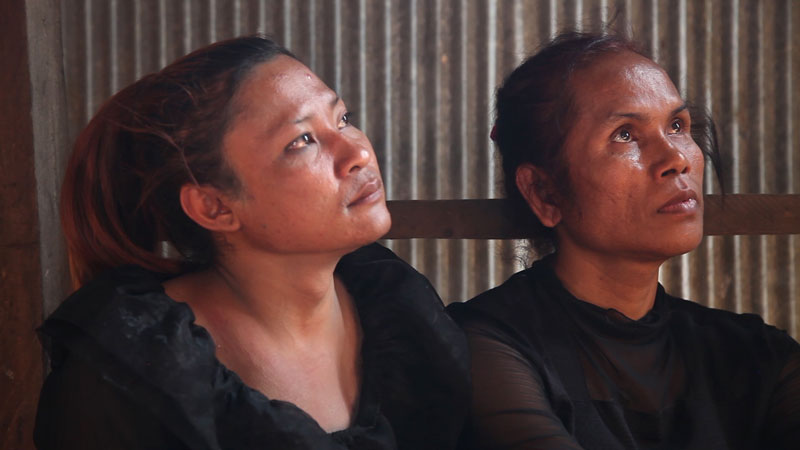Krel Pao looks in the mirror as she powders her face and puts on lipstick. Ms. Pao, 40, is a self-identified “ladyboy” and a sex worker who is battling HIV.
Her life is the subject of Vana Hem’s newest documentary, “Karma,” a 39-minute film that will premiere in Cambodia at a free screening at Meta House on Sunday at 7 p.m.

The documentary opens with Ms. Pao in her former home, near the railroad station in Phnom Penh, which she shares with Srey Leak, 23, another transgender prostitute.
As Ms. Pao cleans their squalid quarters, Ms. Leak wakes up, her face caked with last night’s make-up. “Look after the house,” Ms. Leak shouts to their cat as she leaves the house. “I have to go outside and look for boys.”
Ms. Pao, born biologically male, started dressing like a girl since age 7, she recounts. Shunned by her family, Ms. Pao moved to Phnom Penh and became a sex worker.
“It’s…a hard story to hear,” Mr. Hem said.
The film, a year in the making, was written, directed and produced by Mr. Hem, with the help of three volunteers. It centers on the intimacy between the two women in the face of societal rejection.
“I don’t think that the people or the government care about [transgender people] because they get exploited a lot and they don’t have equal rights, so I need to raise this issue,” the 29-year-old filmmaker said. “Through my research—I interviewed 50 ladyboys—they have very similar stories: They have no job opportunities, no education, sometimes [not] even health service…. Year by year it a little bit gets better, but I still see these kind of issues [are] still a big problem.”
Ms. Pao had her good days, when she could earn about $2.50 for oral sex and $3.75 for sleeping with each client, most of whom don’t know she is transgender.
“I have my trick to confuse them,” she says in the film.
But now her youthful charm is fading, along with her livelihood.
The film affords a private glimpse into the women’s routine—dressing up, styling their hair, lighting incense to pray before hitting the streets. But the dark undertone is palpable: Ms. Pao recounts suffering violence, and Ms. Leak shares the time she was gang raped, just months after starting sex work.
Then, Ms. Pao finds out she tested positive for HIV.
“It’s not easy,” Mr. Vana said of the project. “You need to build a lot of trust with the protagonists in the film. If you never build a lot of trust with them, you’ll never approach them, they’ll never reveal the real story.”
The film was funded in part by a grant from Document Our History Now, a Dutch foundation that supports filmmakers, photographers and journalists in Southeast Asia in documenting lesbian, gay, bisexual and transgender (LGBT) communities. The production is also supported by DocNet Southeast Asia, a Goethe Institut initiative to boost documentary filmmaking in the region.
It features interviews with transgender rights activist Sou Sotheavy and the founder of rights group Licadho, Pung Chhiv Kek, as well as a monk, Ioeung Harmony, who preaches acceptance of LGBT people. The film’s title comes from his description of how being born queer is not a choice—it is karma stemming from unhappiness in a past life.
In this life, Ms. Pao wants a sex change operation and the right to be legally married. Ms. Leak, however, says she takes consolation only in the prospect of reincarnation. “This life…is really closed to us,” Ms. Leak says.




